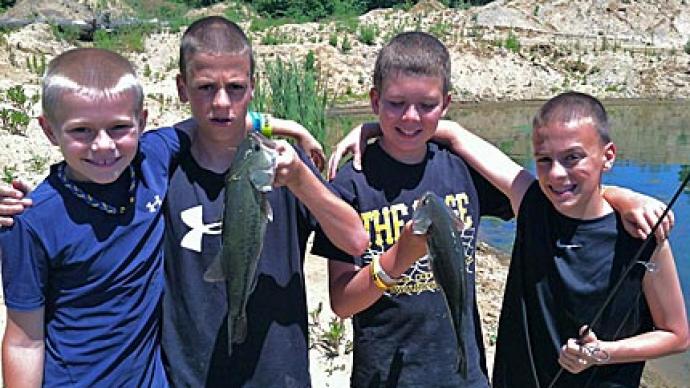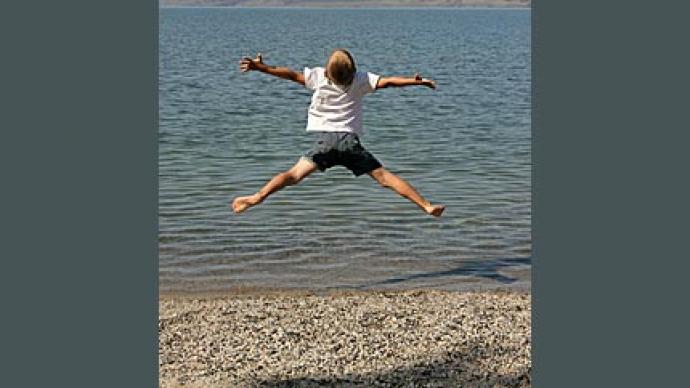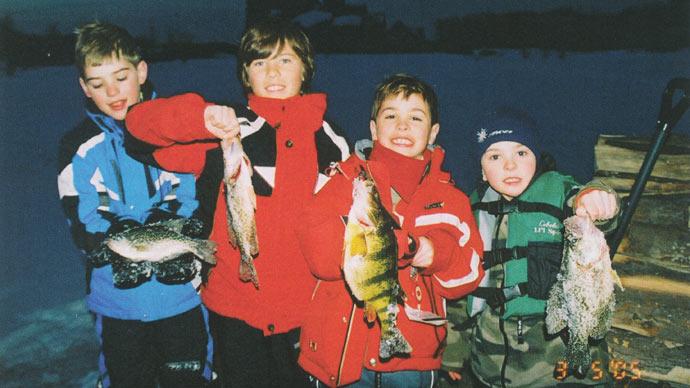
Thanks to everyone who participated in our survey last summer. We enjoyed hearing about your activities to ensure fishing remains a favorite pastime for generations. So in this installment of Empirically Speaking, Dr. Leslie Burger and I would like to summarize the survey's key findings and highlights and recognize all of you pondmeisters for a job well done!
Fishing is a traditional pastime that intimately binds anglers to their environment. Watching a graceful trout rise to a drifting dry fly in the early morning mist is a spiritual experience that transcends the chaos of modern life. For this and many other reasons, fishing can connect an angler to the natural world, instilling a deep desire and motivation to conserve and protect it.
Unfortunately, participation in fishing has declined in recent years. As the proportion of anglers in the public declines, their political power to protect our valuable natural systems also declines. Thus, we must work to recruit new anglers and retain our current anglers so we remain a powerful voice in the conservation of wild places.
Pondmeisters can play a role in this effort. More than four and a half million small ponds and lakes in the United States are owned by people just like you. And although there have been many well-studied public programs designed to recruit children into fishing, no one knows what role private waters play in creating the next fishing generation. That's why we conducted an online survey of pond owners.
The survey used a series of directed questions regarding youth angling access to private waters and the pond owner's role in recruiting youth anglers. Our objective was simple: to determine if private ponds and lakes and their owners contribute to recruiting new anglers.
It is always essential to understand who was surveyed. More than 600 people from 34 states responded to the survey. Most (95%) owned their ponds, although a few rented ponds. Most respondents were older white men with relatively high incomes. Most had one or only a few ponds on their property. A handful of respondents had many ponds on their property, but most of these were aquaculture farms and were not included in further analysis.
We were happy to discover that many children fish in these privately-owned ponds and lakes.
About one-third of respondents reported that up to four children had fished their pond or ponds in the previous year, and another third reported between five and ten children had fished. And about 15% of you reported eleven or more children fishing last year. That's a lot of kids fishing!
As you might expect, these children are usually family and friends. Respondents reported that most children were sons and daughters, nephews and nieces, grandchildren, or family friends. Only about one in seven people reported allowing other children, like youth groups and neighbors, to fish.

Pond owners are actively engaging children in fishing on their ponds. Most pondmeisters surveyed (94%) personally took a child on their pond in the past year (Great job, you guys!). They reported almost 13 trips per year with children on their pond! A little less than a third of respondents still had children living in the household, but almost all (96%) of these kids fished in the pond.
But it didn't stop there - about a third of respondents personally took a child fishing on public waters about five times in the past year. In the recruitment business, they might call this "behavioral reinforcement." By providing multiple exposures to fishing in different environments, you are increasing the likelihood the child will adopt the pastime in the future.
So is it working? Well, that is a little more difficult to determine. Respondents claimed that over 90% of children who had previously fished on their ponds are still fishing today. We don't know if the kids fished their ponds last week, last year, or last decade, but 90% is still pretty darn good. If our 600 respondents took an average of 5 kids fishing in a given year, and 90% permanently adopted the pastime, that's 2,700 new anglers. Fantastic!
These preliminary results suggest that private ponds and their owners are critically important in recruiting children into fishing. They are especially effective in recruiting family and close friends, providing frequent fishing opportunities and exposure, and contributing to the long-term retention of new anglers.
Of course, the people who responded to the survey were what we might call "avid pondmeisters," and the actual new-angler recruitment potential of an individual pond owner/pond might not be so high. But consider this: if only 10% of ponds in the United States recruit just one new angler each year, that means 450,000 new anglers per year with high retention! And we bet that number is conservatively low.
So keep up the excellent work! We know you will because connecting future generations to fishing and the environment is essential to you. Many of you told us so.
One respondent wrote, "Keep up the good work! Kids being outdoors will help everyone's future!" We could not agree more!
Another respondent reflected on their experiences saying, "Watching a child catch a fish is an amazing feeling. Now my four adult daughters regularly take their children and their young friends fishing to pass on the joys." We love seeing our favorite pastime handed down through multiple generations!
And many of you appear to be planning for the future. For example, one survey respondent wrote, "I'm currently building a 10-acre lake on my land and plan to take many kids fishing." Another stated, "/ care for my fishing ponds with a future family in mind." If hindsight is 20/20, then foresight like this is like X-ray vision!
But we can always do more. And we need to do more. Despite the success of private ponds and lakes in recruiting, the proportion of anglers in the general population still needs to grow. If you took five kids fishing on your pond last year, try to take ten kids this year. Invite your local church youth group out for a day of fishing, and encourage your neighbors to do the same. Teach the children the importance of conservation; and the value of clean water, especially the need for ethical behavior outdoors. Tell them stories about your angling experiences and how they changed the way you view the world.
Remember that there are lots of tools and resources available to help you. Check with your state fish management agency, as they often have personnel designated to angler recruitment. They may have programs in place or resources that can be provided. And you could offer to volunteer your time for educational programming on your pond for fishing events.
You also can explore online and find a wealth of information. One excellent site to explore is www.takemefishing.org, which provides how-to information ranging from the basics to relatively advanced techniques.
Thank you all again for participating in our survey and for everything you do to connect children to the outdoors. This modern world has a growing range of recreational opportunities, and outdoor recreation pursuits like fishing are often overlooked. But, with a little effort, we can ensure our favorite pastime is not lost. So take a child fishing today, and help make sure the future is filled with passionate anglers ready to conserve our aquatic natural resources!
Reprinted with permission from Pond Boss Magazine



